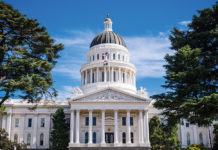I appreciate your three informative November articles on the
wine industry’s claim for the life-giving water without which
native salmon would perish. I support the State Water Resources
Control Board proposed regulation that would defend endangered fish
from deadly practices by the wine industry.
The wine industry diverts water to protect its mono-crop from
frost, which reduces water levels and kills salmon. Current
self-regulated wine industry practices threaten the local survival
of this key species. Who trusts a “self-regulated” fox to guard
chickens?
Your Nov. 10 commentary by an attorney for the environmental
watchdog group Northern California River Watch, Jerry Bernhaut,
criticizes a speculative study by SSU economics professor Robert
Eyler. “River environmental advocates,” according to your Nov. 4
news article, describe the study as “more wine industry propaganda
than objective research.” David Keller of Friends of the Eel River
says that to have academic credibility that study should have been
peer reviewed, which it was not.
New York City’s former deputy mayor John Dyson, who now owns the
Williams Selyem Winery, funded it. He warns that California’s new
rules would “damage the entire nation.” Pardon this journalist’s
skepticism about his inflated assertion. We do love our wine,
including myself, here in the Redwood Empire. But most of the
“nation” does not even drink wine.
Water board spokesperson William Rukeyser notes that similar
regulations on the Napa River have existed for decades without
creating “desolation and destruction” for their powerful wine
industry. Water board Executive Director Tom Howard calls those
regulations “reasonable and feasible.”
The wine industry speculates that some profits would be lost.
The alternative is that lives would be lost, those of salmon, an
indicator species whose health in our region indicates the
well-being of our watersheds and ecosystems as a whole.
As a food farmer, I have a further concern with the excessive
power of a profit-driven wine industry. Wine has become big
business and its industry throws its weight around. Sonoma County’s
agriculture and economy have become too dependent upon one crop.
Mono-crops are dangerous; they are more vulnerable to be destroyed
by a pest or by changing economics and tastes.
We derive benefits from wine. A moderate amount of wine would be
fine, but we now have an economy dominated by this powerful
industry, much of which is owned by global corporations based
outside the county.
The wine industry claims that the new regulations would “force
some vineyards out of business.” Some were planted in vulnerable
bottomlands where they should not be. Now they want us to sacrifice
salmon at the wine god’s altar?
The wine industry has reacted before with irrational fear. About
a decade ago it alleged that the glassy-winged sharpshooter was a
potential pest that could destroy the industry. So it proposed
pre-emptive strikes by spraying deadly pesticides on people’s lawns
and farms, without their permission, to kill the bug. This would
have destroyed Sonoma County’s organic farms and worsened the
health of vulnerable people.
Fortunately, citizens organized the No Spray Action Network and
backed off the wine industry. The feared pest did not take the
industry down. It’s time to support salmon, as well as redwoods and
forests that the wine industry continues to cut down.
Before this special region was reduced to the mono-crop and
commercial designation “wine country,” it was known as “The Redwood
Empire,” a natural description. Redwoods and salmon are more
important to the long-term sustainability of this area than more
wine.
Around 100 environmentalists, alcohol producers, and water
professionals attended a recent meeting on this issue. A next stage
of this power struggle will be a Sonoma County Supervisors public
hearing Dec. 7, 2:30.
Support the salmon and redwoods!
Dr. Shepherd Bliss teaches at SSU and has operated a fruit
farm in the Sebastopol countryside since 1992. He can be reached at
sb*@po*.net.
62.5
F
Healdsburg
April 19, 2025







